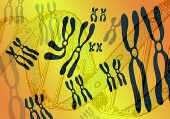Emory University researchers explained their use of these technologies to find microdeletions and microduplications in a specific region of one chromosome, called 1q21.1, in patients with unexplained mental retardation, autism or congenital anomalies in an article published online this week in the New England Journal of Medicine.
"In the early 1960s, we began discovering the relationship between chromosome imbalance and diseases and syndromes, such as Down syndrome," David H. Ledbetter, a professor of human genetics at Emory University in Atlanta, said in a university news release. "This was based on identifying multiple patients with the same cytogenetic abnormality and similar clinical symptoms. Ever since then, technology breakthroughs have allowed us to identify new syndromes and ever more subtle genetic differences."
Ledbetter, who also wrote an editorial that accompanied his colleague's article, said he believes the availability of this new information may help clinicians shift to a "genotype first" model of diagnosis.
As increases in genetic information have led researchers to learn that many small genetic variations are common and mostly benign in people, they have realized they need to be able to more finely analyze the relationship between DNA variations and disease before declaring they have found true connections.
Researchers, for example, must show that the difference is never found in other normal or near-normal individuals.
Also, a particular genetic variation may only mildly affect a parent but present a much more severe effect in a child who inherits the same variant, while a group of children with the same gene variation may have many different problems because of it.
"So many variations of developmental disorders and syndromes have been discovered that genetic testing has become essential for making a specific clinical diagnosis," Ledbetter said. "Although more information has made the job of a diagnostician even more challenging, it also is leading to more accurate diagnoses and should lead to much more effective treatments."
More information
The U.S. National Library of Medicine has more about genetic and birth defects.
Attribution: -- Kevin McKeeverSOURCE: Emory University, news release, Sept. 10, 2008
Copyright © 2008 ScoutNews, LLC
 . All rights reserved.
. All rights reserved.HealthDayNews articles are derived from various sources and do not reflect federal policy.
omhrc.gov does not endorse opinions, products, or services that may appear in news stories.


